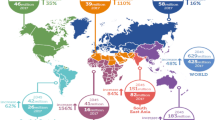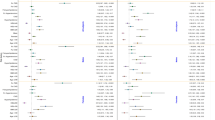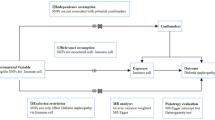Abstract
Purpose
Type 2 diabetes mellitus (T2DM) is a global health problem with multiple etiological factors. Previous studies indicated that 1- alpha, 25-dihydroxyvitamin D3, a molecule that is produced by CYP27B1, could protect insulin-secreted cells from destruction by immune cells. The aim of the study was to investigate the CYP27B1 promoter gene polymorphism in T2DM.
Methods
Two hundred subjects including 100 T2DM and 100 healthy individuals were recruited in the study. ARMS-PCR technique was used to identify rs10877012 genotypes in the 5′ region of CYP27B1.
Results
The frequency of CC, CA, and AA genotype was 61/50, 31/39, and 8/11, respectively in T2DM patients compared to healthy subjects. There was no significant difference between both groups in regarding to genotype and allele distribution (P > 0.05). CA (RR = 1.535, 95% CI = 0.841- 2.802) and AA (1.677, 95% CI = 0.627-4.490) genotypes had no association with increased risk of T2DM. In addition, CA + AA versus CC showed no increased risk for T2DM (RR = 0.639, 95% CI = 0.365-1.121).
Conclusion
We found no association between rs10877012 polymorphism and T2DM. There was no increased risk of this polymorphism in T2DM. Further studies with large groups are suggested in other populations to better understand the relation of CYP27B1 gene variation, especially its ethnicity-dependent relation with T2DM.
Similar content being viewed by others
Data availability
Data would be available upon a reasonable request.
References
Khan MAB, Hashim MJ, King JK, et al. Epidemiology of type 2 diabetes–global burden of disease and forecasted trends. J Epidemiol Glob Health. 2020;10(1):107.
Wild S, Roglic G, Green A, et al. Global prevalence of diabetes: estimates for the year 2000 and projections for 2030. Diabetes Care. 2004;27(5):1047–53.
DeFronzo RA. Pathogenesis of type 2 diabetes mellitus. Med Clin. 2004;88(4):787–835.
Bailey R, Cooper JD, Zeitels L, et al. Association of the vitamin D metabolism gene CYP27B1 with type 1 diabetes. Diabetes. 2007;56(10):2616–21.
Grimnes G, Figenschau Y, Almås B, et al. Vitamin D, insulin secretion, sensitivity, and lipids: results from a case-control study and a randomized controlled trial using hyperglycemic clamp technique. Diabetes. 2011;60(11):2748–57.
Mitri J, Muraru M, Pittas A. Vitamin D and type 2 diabetes: a systematic review. Eur J Clin Nutr. 2011;65(9):1005–15.
Tanaka Y, Seino Y, Ishida M, et al. Effect of vitamin D3 on the pancreatic secretion of insulin and somatostatin. Eur J Endocrinol. 1984;105(4):528–33.
Ortlepp J, Metrikat J, Albrecht M, et al. The vitamin D receptor gene variant and physical activity predicts fasting glucose levels in healthy young men. Diabet Med. 2003;20(6):451–4.
Kawashima H, Kurokawa K. Unique hormonal regulation of vitamin D metabolism in the mammalian kidney. Miner Electrolyte Metab. 1983;9(4-6):227–35.
Kawashima H, Torikai S, Kurokawa K. Calcitonin selectively stimulates 25-hydroxyvitamin D 3-1 α-hydroxylase in proximal straight tubule of rat kidney. Nature. 1981;291(5813):327–9.
Tangpricha V, Flanagan JN, Whitlatch LW, et al. 25-Hydroxyvitamin D-1α-hydroxylase in normal and malignant colon tissue. Lancet. 2001;357(9269):1673–4.
Sawada N, Sakaki T, Kitanaka S, et al. Enzymatic properties of human 25-hydroxyvitamin D3 1α-hydroxylase: Coexpression with adrenodoxin and NADPH–adrenodoxin reductase in Escherichia coli. Eur J Biochem. 1999;265(3):950–6.
Zalewski A, Ma NS, Legeza B, et al. Vitamin D-dependent rickets type 1 caused by mutations in CYP27B1 affecting protein interactions with adrenodoxin. J Clin Endocrinol Metabol. 2016;101(9):3409–18.
Lopez ER, Regulla K, Pani MA, et al. CYP27B1 polymorphisms variants are associated with type 1 diabetes mellitus in Germans. J Steroid Biochem Mol Biol. 2004;89:155–7.
Klahold E, Penna-Martinez M, Bruns F, et al. Vitamin D in type 2 diabetes: genetic susceptibility and the response to supplementation. Horm Metab Res. 2020;52(07):492–9.
Ma X, Xie Z, Qin J, et al. Association of vitamin D pathway gene CYP27B1 and CYP2R1 polymorphisms with autoimmune endocrine disorders: a meta-analysis. J Clin Endocrinol Metabol. 2020;105(11):3575–87.
Cusato J, Boglione L, De Nicolò A, et al. Vitamin D pathway gene polymorphisms and hepatocellular carcinoma in chronic hepatitis C-affected patients treated with new drugs. Cancer Chemother Pharmacol. 2018;81(3):615–20.
Fichna M, Żurawek M, Januszkiewicz-Lewandowska D, et al. Association of the CYP27B1 C (− 1260) a polymorphism with autoimmune Addison's disease. Exp Clin Endocrinol Diabetes. 2010;118(08):544–9.
Jolliffe DA, Walton RT, Griffiths CJ, et al. Single nucleotide polymorphisms in the vitamin D pathway associating with circulating concentrations of vitamin D metabolites and non-skeletal health outcomes: review of genetic association studies. J Steroid Biochem Mol Biol. 2016;164:18–29.
Reimers LL, Crew KD, Bradshaw PT, et al. Vitamin D-related gene polymorphisms, plasma 25-hydroxyvitamin D, and breast cancer risk. Cancer Causes Control. 2015;26(2):187–203.
Najafi M, Roustazadeh A, Amirfarhangi A, et al. Matrix Gla protein (MGP) promoter polymorphic variants and its serum level in stenosis of coronary artery. Mol Biol Rep. 2014;41(3):1779–86.
McGrath JJ, Saha S, Burne TH, et al. A systematic review of the association between common single nucleotide polymorphisms and 25-hydroxyvitamin D concentrations. J Steroid Biochem Mol Biol. 2010;121(1-2):471–7.
Miettinen ME, Smart MC, Kinnunen L, et al. Genetic determinants of serum 25-hydroxyvitamin D concentration during pregnancy and type 1 diabetes in the child. PLoS One. 2017;12(10):e0184942.
Alathari BE, Sabta AA, Kalpana CA, et al. Vitamin D pathway-related gene polymorphisms and their association with metabolic diseases: a literature review. J Diabetes Metabol Disord. 2020:1–29.
Hu Z, Tao S, Liu H, et al. The association between polymorphisms of vitamin d metabolic-related genes and vitamin D3 supplementation in type 2 diabetic patients. J Diabetes Res. 2019;2019
Acknowledgments
This study was supported by vice chancellery of research affairs of Jahrom University of Medical Sciences.
Funding
This study was supported by Jahrom University of Medical Sciences.
Author information
Authors and Affiliations
Contributions
AR supervised the study and wrote the manuscript.SE assisted in laboratory measurements and manuscript writing.
Corresponding author
Ethics declarations
Ethics approval
Ethics committee of Jahrom University of Medical sciences approved the study.
Competing interests
None for all authors.
Additional information
Publisher’s note
Springer Nature remains neutral with regard to jurisdictional claims in published maps and institutional affiliations.
Rights and permissions
About this article
Cite this article
Erfanian, S., Roustazadeh, A. Lack of association between CYP27B1 gene polymorphism and type 2 diabetes mellitus in Iranian patients. J Diabetes Metab Disord 21, 517–520 (2022). https://doi.org/10.1007/s40200-022-01003-5
Received:
Accepted:
Published:
Issue Date:
DOI: https://doi.org/10.1007/s40200-022-01003-5




